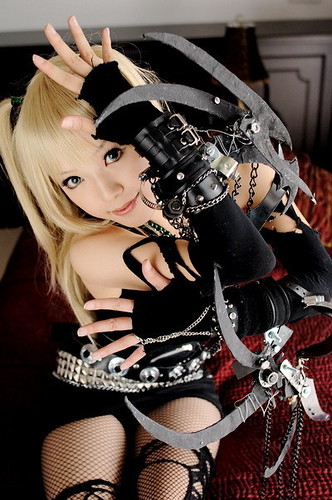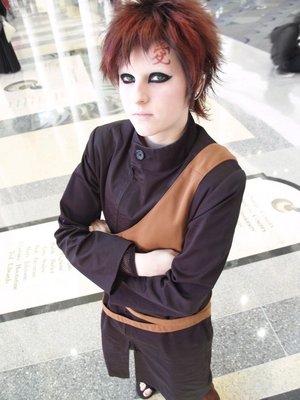So seeing as this is probably going to be my last blog entry, I thought I'd save my favorite animated series for last. This series is one of the reasons I got so into animation in the first place. It's called Neon Genesis Evangelion.
Neon Genesis Evangelion is at first glance, a typical giant robot show. It's premise is that in the year 2000 (the series aired from 1995 to 1996) a meteor struck Antarctica, flooding the Earth, and killing half the human population. Afterwards, these giant monsters referred to as Angels begin attacking humanity. The only thing which can fight the Angels are these giant robots called Evangelions. And the only people who can pilot the Evangelions are three teenagers named Shinji Ikari, Rei Ayanami, and Asuka Soryu.
The first thing that stands out about Neon Genesis Evangelion (commonly referred to as "Eva") is that the designs of the Angels are some of the most creative monster designs I've ever seen. The designs captivate you, and do to the fact that the Angels regularly defy physics, each episode's fight with an Angel is intense and exciting to watch.
However, the main appeal about Eva is the characters. Like I said, at first glance, Eva appears to be a pretty typical giant robot show. However, as time goes on, you see that it's really a psychological examination of the characters. Each of the characters has mental and emotional issues, and this eventually becomes the main drama of the series, with the Angels and the whole question of why they exist becoming sort of a subplot.
Basically, the main theme of Eva is an examination of alienation, depression and the distance humans put between each other. The series creator, Hideaki Anno, was depressed at the time he created the series and it shows throughout the series. As the series goes on, it gets more and more disturbing. When it first aired it was originally on primetime. Eventually, it had to be moved to a timeslot after midnight because it would have been too disturbing to air on primetime.
The whole trend of the series becoming more dark also applies to the animation. Eventually, the animation becomes so twisted that it can only be described as postmodern. The animation is also rife with religious symbolism, and many a person has tried to analyze all of the symbolism in Eva. The concluding movie to the series, End of Evangelion, looks like it was made on acid. In fact, here's my approximate reaction when I first started the series and when it ended:
Beginning of the Series: "Huh, this looks like a pretty typical giant robot show. I wonder what's the big deal?"
End of Evangelion: "...WHAT THE FUCK DID I JUST WATCH?"
Eva made a huge impression on me when I first watched it, mainly because I could relate in a way to many of the characters, and its whole plot left me speechless. Countless people have felt the same way after viewing it. Neon Genesis Evangelion made a huge impact when it aired, and it continues to influence animation to this day. Everyone should watch it, if only to view one of the most iconic anime series of all time.
On one final note, Hideaki Anno has recently started making a remake of the series, in the form of four movies, called Rebuild of Evangelion. It's undoubtedly influenced by the fact that Hideaki Anno has grown a lot as a person in the fifteen years since Eva first aired, and is now happily married with a daughter. The focus is no longer on psychological drama. Instead, its main appeal is that many of the Angel fights are now redone with amazing animation and CGI, and many characters spend less time contemplating their emotional issues, and more time fighting Angels. In addition, neglected characters from the series seem to be getting more character development so far. Two movies are already out on DVD and Blu-Ray, and two more are planned. However, I wouldn't recommend watching Rebuild of Evangelion before the original Neon Genesis Evangelion series. Rebuild has its own appeal, but its much better to appreciate when you've already seen the series. Finally, I hope you love the series as much as I did.
Neon Genesis Evangelion is at first glance, a typical giant robot show. It's premise is that in the year 2000 (the series aired from 1995 to 1996) a meteor struck Antarctica, flooding the Earth, and killing half the human population. Afterwards, these giant monsters referred to as Angels begin attacking humanity. The only thing which can fight the Angels are these giant robots called Evangelions. And the only people who can pilot the Evangelions are three teenagers named Shinji Ikari, Rei Ayanami, and Asuka Soryu.
The first thing that stands out about Neon Genesis Evangelion (commonly referred to as "Eva") is that the designs of the Angels are some of the most creative monster designs I've ever seen. The designs captivate you, and do to the fact that the Angels regularly defy physics, each episode's fight with an Angel is intense and exciting to watch.
 |
| Above: An Evangelion fighting an Angel |
However, the main appeal about Eva is the characters. Like I said, at first glance, Eva appears to be a pretty typical giant robot show. However, as time goes on, you see that it's really a psychological examination of the characters. Each of the characters has mental and emotional issues, and this eventually becomes the main drama of the series, with the Angels and the whole question of why they exist becoming sort of a subplot.
Basically, the main theme of Eva is an examination of alienation, depression and the distance humans put between each other. The series creator, Hideaki Anno, was depressed at the time he created the series and it shows throughout the series. As the series goes on, it gets more and more disturbing. When it first aired it was originally on primetime. Eventually, it had to be moved to a timeslot after midnight because it would have been too disturbing to air on primetime.
The whole trend of the series becoming more dark also applies to the animation. Eventually, the animation becomes so twisted that it can only be described as postmodern. The animation is also rife with religious symbolism, and many a person has tried to analyze all of the symbolism in Eva. The concluding movie to the series, End of Evangelion, looks like it was made on acid. In fact, here's my approximate reaction when I first started the series and when it ended:
Beginning of the Series: "Huh, this looks like a pretty typical giant robot show. I wonder what's the big deal?"
End of Evangelion: "...WHAT THE FUCK DID I JUST WATCH?"
Eva made a huge impression on me when I first watched it, mainly because I could relate in a way to many of the characters, and its whole plot left me speechless. Countless people have felt the same way after viewing it. Neon Genesis Evangelion made a huge impact when it aired, and it continues to influence animation to this day. Everyone should watch it, if only to view one of the most iconic anime series of all time.
On one final note, Hideaki Anno has recently started making a remake of the series, in the form of four movies, called Rebuild of Evangelion. It's undoubtedly influenced by the fact that Hideaki Anno has grown a lot as a person in the fifteen years since Eva first aired, and is now happily married with a daughter. The focus is no longer on psychological drama. Instead, its main appeal is that many of the Angel fights are now redone with amazing animation and CGI, and many characters spend less time contemplating their emotional issues, and more time fighting Angels. In addition, neglected characters from the series seem to be getting more character development so far. Two movies are already out on DVD and Blu-Ray, and two more are planned. However, I wouldn't recommend watching Rebuild of Evangelion before the original Neon Genesis Evangelion series. Rebuild has its own appeal, but its much better to appreciate when you've already seen the series. Finally, I hope you love the series as much as I did.




































































No comments:
Post a Comment